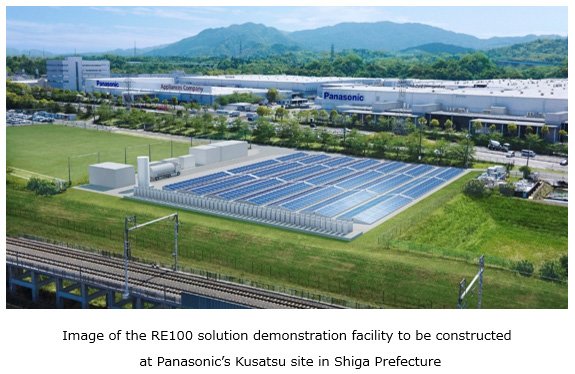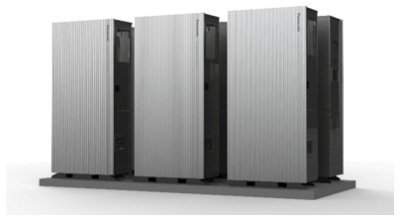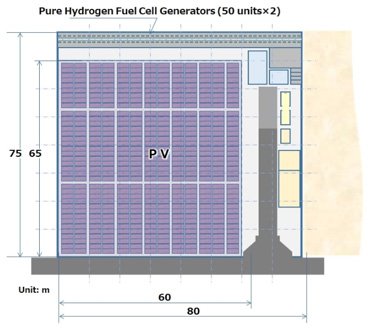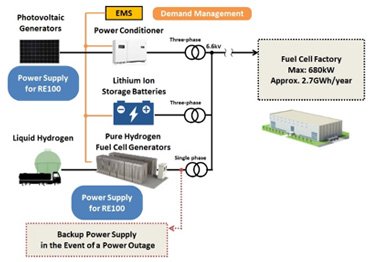
Feb 27, 2026
- Products & Solutions
- Topics
- India, Middle East and Africa
- Business Solutions
- Operating Company
May 24, 2021
Products & Solutions / Press Releases
- This involves the world's first1 "RE100 factory" with full-scale use of hydrogen2

Osaka, Japan - Panasonic Corporation today announced its plan to demonstrate an "RE100 solution" that supplies 100% of the electricity consumed in business activities from renewable sources by using an in-house power generation system combining pure hydrogen fuel cell generators and photovoltaic generators. This is the world's first1 attempt to create an "RE100 factory" through the full-scale use of hydrogen.2
The idea that three perspectives of ESG (environmental, social, and governance) are essential for sustainable corporate growth is spreading around the world. Against this background, an increasing number of companies are joining the RE100 (Renewable Energy 100%) initiative3 to ensure that 100% of the electricity consumed in business activities is generated through renewable sources such as solar, wind, geothermal, and hydraulic power, and biomass.
There are two main methods of procuring renewable electricity, in-house power generation and external procurement. There are also various external procurement options, including direct contracts with business operators who own power-supply systems that use renewable energy and the use of energy attribute certificates. Companies will choose from these options to ensure a 100% ratio of power generated from renewable sources. However, there are different types of energy attribute certificates and their supply and price depend on market conditions. Furthermore, photovoltaic power generation systems, which have become widespread as a means of generating power in-house, have some obstacles as a means for companies to achieve RE100. They require a wide installation area to supply all the electricity required for business activities, and their power generation is unstable due to their susceptibility to weather.
As a means to resolve these issues, Panasonic proposes a solution that combines pure hydrogen fuel cell generators, photovoltaic generators, and storage batteries. To demonstrate this solution, Panasonic will build a large facility at its Kusatsu site in Shiga Prefecture, which is equipped with an in-house power generation system that combines pure hydrogen fuel cell generators (500 kW) and photovoltaic generators (approx. 570 kW), as well as lithium-ion storage batteries (approx. 1.1 MWh) for storing surplus power. The power generated with this system supplies the entire power used in manufacturing departments of the fuel cell factory located within the Kusatsu site. In parallel, Panasonic will develop and verify technologies related to the optimal power supply and demand management based on integrated control of the power generators and the storage battery system.
The above combination will help solve the problem with photovoltaic power generation, which requires a large installation area and is susceptible to weather conditions, resulting in unstable power generation. In addition, this will enable the construction of an in-house power generation system in a limited space, such as on the roof of a factory, to supply efficient and stable electricity for business activities. Furthermore, the combination of lithium storage batteries enables adequate energy management in response to power demand and effective use of surplus power generated during days when the factory is not in operation. Through this demonstration, Panasonic will accumulate know-how and establish a track record in energy management, including the operation of pure hydrogen fuel cell generators, and aim to commercialize the RE100 solution, which uses power generated in-house from renewable sources to supply 100% of the electricity required for business activities.
Panasonic will contribute to the decarbonization of society by proposing new options for expanding the adoption of renewable sources with the full-scale use of hydrogen.2
As a means to supply 100% of the electricity used in the factory by using renewable sources, Panasonic will start a demonstration work of an energy management system based on integrated control of pure hydrogen fuel cell generators, photovoltaic generators, and lithium-ion storage batteries in the spring of 2022.
 Pure hydrogen fuel cell generators arranged for
Pure hydrogen fuel cell generators arranged forIn order to simulate the operation of the power generation system on a factory rooftop, the equipment will be installed on a surface area equivalent to the building area of Panasonic's fuel cell factory (Kusatsu City, Shiga Prefecture) to supply the electricity used in the factory.
 Layout of the RE100 solution
Layout of the RE100 solution Configuration of the RE100 solution
Configuration of the RE100 solution| Location | Kusatsu Site, Appliances Company, Panasonic Corporation 2-3-1 Noji-higashi, Kusatsu City, Shiga Prefecture |
|---|---|
| Power output | Approx. 1.07 MW (pure hydrogen fuel cell generators: 500 kW and photovoltaic generators: approx. 570 kW) |
| Power storage capacity | Approx. 1.1 MWh (Lithium storage batteries) |
| Facility area | Approx. 6,000 m2 (approx. 80 m × 75 m) |
| Peak power | Approx. 680 kW |
|---|---|
| Annual power consumption in manufacturing departments | Approx. 2.7 GWh |
| Production item | ENE-FARM household fuel cell cogeneration system |
| Building area | Approx. 4,125 m2 (approx. 75 m × 55 m) |
| Power output | 5 kW |
|---|---|
| Rated power generation efficiency | 56% (LHV) |
| Main unit dimensions | 834 mm (W) × 417 mm (D) × 1,766 mm (H) |
| Weight | Approx. 205 kg |
| Power generation system | Mono-generation/cogeneration system |
| Method | Liquid hydrogen storage tank |
|---|---|
| Capacity | Approx. 20,000 m3 (gas equivalent) |
| Supplier | Iwatani Corporation |
The above information is based on a plan and is subject to change without notice.
Panasonic Corporation Brand Strategy Division Corporate PR Department
https://news.panasonic.com/global/contacts/
Panasonic Corporation is a global leader developing innovative technologies and solutions for wide-ranging applications in the consumer electronics, housing, automotive, and B2B sectors. The company, which celebrated its 100th anniversary in 2018, operates 522 subsidiaries and 69 associated companies worldwide and reported consolidated net sales of 6,698.8 billion yen for the year ended March 31, 2021. Committed to pursuing new value through collaborative innovation, the company uses its technologies to create a better life and a better world for customers. Learn more about Panasonic: https://www.panasonic.com/global.
The content in this website is accurate at the time of publication but may be subject to change without notice.
Please note therefore that these documents may not always contain the most up-to-date information.
Please note that German, Spanish and Chinese versions are machine translations, so the quality and accuracy may vary.